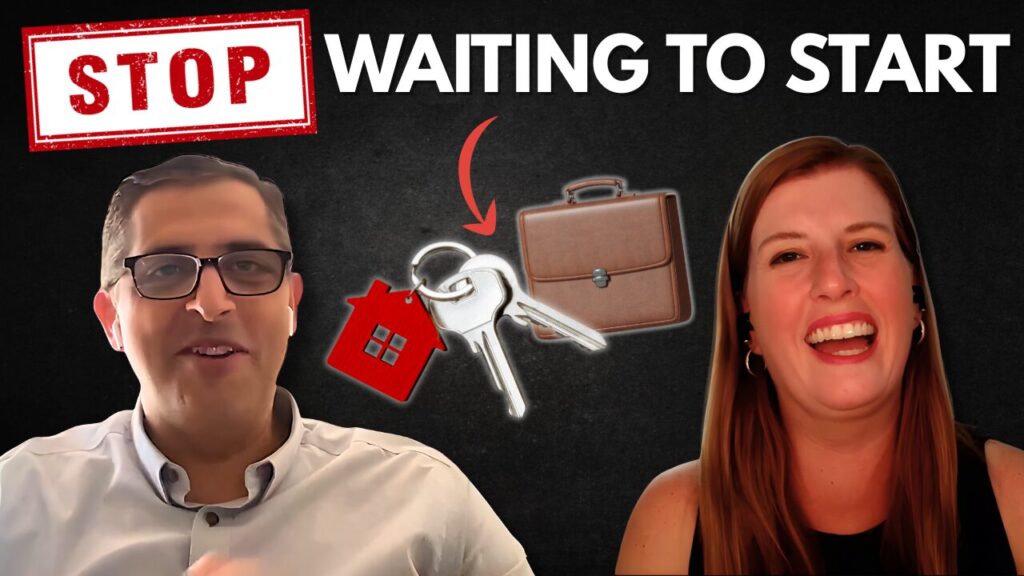
If you’ve ever felt like you’re stuck at 3–5 properties, unsure of how to scale your portfolio without losing your mind (or your W-2 job), this conversation with my long-time friend and investor George Mina is a must-watch. George shares how he built a 750+ unit portfolio while still working full-time in IT leadership. We dig into how to overcome fixed-mindset beliefs, build systems, scale with virtual assistants, and use tech as an ally—not a barrier. Plus, he shares his mindset transformation, how he found his personal “why,” and how he now helps other high-achieving professionals follow the same path to real estate freedom.
For a complete guide on optimizing and scaling your real estate investments, download my Freedom Blueprint! This essential tool walks you through ten key steps for organizing a profitable property portfolio. Click here to get your copy today!
Hello everyone, and I’m very excited to have George Mina with me today.
Thank you so much. Happy to be here.
We’ve known each other for years, and I’m really excited to share your story. You bring a lot of wisdom and experience to the table. Let’s start for our listeners: can you tell me, what does your investing portfolio look like?
Great question, and thanks again for having me. We’ve got a large portfolio ranging from single-family to commercial and large multifamily. We started with small multifamily and single-family homes in Chattanooga.
That’s one of the reasons I’m so excited to have you on. I’ve seen you grow. Let’s go back to the beginning. You’re based in Atlanta. How did you get started in Chattanooga, and where did that take you?
Chattanooga was a logical path. We lived in Atlanta, and it was our halfway point. My in-laws live in Nashville, so we’d go halfway to Chattanooga to drop off our kids for the weekend. As we got more into it, we realized it was a great city to invest in. We had done a mastermind for physician investors. At the time, my wife would listen to these podcasts endlessly. I was like, what are you listening to? I’ve got my nine-to-five job—I’m happy here. But as I dug deeper, I started realizing the significant benefits and freedoms associated with real estate and began reflecting on my personal why. It became very evident that real estate was a great path, and Chattanooga was an exceptional starting point for us.
What I love about that is how personal it was. So often people chase the “hot market” on BiggerPockets or forums, and everyone flocks to the same place. You chose a market that made sense financially but also fit your lifestyle.
Absolutely. It’s only two hours away. I’m not saying I go there often anymore, but it’s accessible. We love going for the weekends. So it made a lot of sense for us.
That’s something I think real estate investors underutilize. If you choose a market that you enjoy, now you can write off those trips as business travel while checking on your properties. Nice bonus, right?
Absolutely. I can’t count the number of times we doubled down on a trip. We’d go to visit the property, and the kids would be like, “Oh no, another property?” But we had fun throughout the process.
Oh yeah, it’s definitely an adventure. And kids learn so much when they’re along for the ride.
Now, let’s talk about your background. You don’t come from a real estate family. Your background is very W-2, very IT leadership. You spent over two decades in that space. What really motivated you to start focusing on something beyond the W-2?
Great question. I reflect on that often. I still have a fantastic W-2 job. I’ve been in the same field going on three decades. But about five years ago, I started hearing people’s stories about their path to freedom and more importantly, their whys. I started digging deeper into my own why. Much of my drive in my job was extrinsic—chasing the next promotion or level up. But when I reflected on what truly mattered, it was faith, family, and impact. Real estate became the path to enable those freedoms. That’s my North Star. I have a vision board right behind me that I look at daily. That’s where we continue to scale our portfolio.
I love that. So many investors say, “I’m starting with this strategy because it makes sense on paper,” but they never ask why. I always say, if you don’t know your why, you’ll get distracted by shiny object syndrome. I love that you started with core values.
There are always bumps on the road, but that’s what makes it fun. You grow through discomfort. I’m not the same person I was a year ago, three years ago, or five years ago. I come from a very fixed mindset background—electrical engineer, same job for life. I played it safe for years. Then five years ago, my wife asked, “Are you really satisfied?” I said yes, but deep down, I wasn’t. I realized I wasn’t living aligned with my values. That mindset shift enabled the pivot to real estate.
That was actually my next question—what beliefs you had to unlearn. You hit that with fixed mindset. Now I’m curious, how did you prepare yourself mentally for the uncertainty of real estate? It’s very different from the W-2 world.
I was terrified when we started. I had no idea what I was doing. The terminology was foreign. But I surrounded myself with people who had done it before. My success in IT came from people and processes, and the same applied to real estate. Reliable teams, deep relationships—they helped me scale. My wife was also key. If it wasn’t for her, I probably would’ve passed on a lot of deals. I would’ve stayed in my lane.
She helped push you out of your comfort zone?
She did early on. Now, it’s the opposite. I go for it. That mindset shift and having the right team gave me confidence to pursue big opportunities.
And you’ve mentioned people and processes. What does the process side look like for you?
We use Hemlane for property management. I wanted to work in the business first to understand it, then step back to work on the business. Processes include templates for leases, automated rent collection, tenant communication, even cash-for-keys systems. If you build these systems early, you don’t have to do it all alone.
I completely agree. It’s a mindset thing—if you think it’s too hard, you won’t even start. But once you do, you raise your floor. You realize you’re capable of more than you thought.
Exactly.
Now, you’ve scaled to over 750 doors. That’s incredible. You started with small multis, then moved to syndications and larger assets. What’s your personal filter now when evaluating deals?
Our first deal was a full BRRR in Chattanooga. We bought it for $70K, put $60K into it. It was terrifying, but we had a great team. Then we scaled into small multis, then general partner roles in syndications. The key was systems, processes, and learning from others. We closed zero deals until December last year, then closed four—including a 1031 exchange, an 86-unit in St. Louis, a 242-unit syndication, and a 72-unit near my house.
You’ve climbed your version of Everest. If someone is stuck at 3–5 properties, overwhelmed—what should they do to scale?
It’s all about people. You will hit a wall trying to do it alone. You’ll run out of funds or time. You need partners. Also, when you meet agents or lenders, don’t just think “What’s in it for me?” Think “How can I help them?” That builds credibility. After closing multiple large deals, you have the track record to open doors. That’s how we scaled.
What advice would you give someone who’s scared of partnerships?
Partnerships aren’t transactions—they’re long-term relationships. Every conversation is about how I can help the other person. That mindset builds trust over time. Even if you only own a few properties, you’re ahead of the person still overanalyzing. Right now, the market looks scary—but that’s where the real opportunity is.
Let’s talk about your team and how virtual assistants have supported your growth.
In Chattanooga, I built a great team of tradespeople. I invested in them as the face of my business. As we scaled, VAs became critical. For example, they build our offering memorandums for syndications. That saves me time so I can focus on strategy, relationships, and underwriting. We’re forming a team like Voltron: investment relations, fractional CFO, VAs for content, capital raising support. The goal is to work on the business, not just in it.
I can relate to that as a detail-oriented person. Letting go is tough.
Exactly. My instinct is to take over, but if you don’t empower others, they’ll just wait for you to do it. One of my partners reminded me—you have to let people do their job.
Let’s talk tech. Beyond Hemlane, what tools do you use?
Even though I’m deep in tech, I haven’t tapped into everything. For large multifamily, we use RealPages, Buildium, and others—but my team handles that. I just need the executive summary. For syndications, we use Cashflow Portal to raise and communicate with investors. Their support team is amazing. So again, it’s about the right tech with the right people.
Love that. I need to remember to use tech support more! Now—if you had to start over with $100K and your current knowledge, what would you do?
I would have started earlier. That mindset shift is key. If I had $100K, I’d leverage it. Not pay all cash. I’d buy small multifamily or partner into something bigger. Multifamily is great because of risk mitigation and economies of scale. Our best property is a quad in Highland Park, Chattanooga, and it has super low expenses.
Such great advice. Let’s say someone listening is burned out in corporate. What do you want them to know?
Reflect on what really matters. What’s your Why? That shapes every decision. And then—take action. Don’t sit on the sidelines. You don’t have to know it all. Start by joining a mastermind or going to a local meetup. I stayed stuck because I wanted everything to be perfect. My wife asking, “Are you satisfied?” dug deep. And no, I wasn’t. But I needed that discomfort to grow.
So true. That discomfort often means you’re getting closer to what matters.
We’re all going to die. I want to have impact. If I can help people on their journey, that’s what I want to do. You need to dig deep and live aligned with your Why.
All right, let’s close with some rapid fire!
Cashflow or appreciation?
Cashflow—100%. Appreciation is a bonus.
Favorite real estate book?
Managing Real Estate by Brandon Turner. For mindset, Everyday Hero Manifesto by Robin Sharma.
Morning routine must-have?
I don’t have a morning routine—but in the afternoon, I go to the gym. That’s my reset.
I love it. Now, I know you’re launching something to help others replicate your journey. Want to share?
Yes! It’s called WFH Investor—Work From Home Investor. It’s a five-week mastermind to help corporate professionals take action. We cover mindset, market selection, team building, underwriting, and building a 90-day plan. It’s not perfect—but it’s real. And we have a great community of investors, lenders, agents, and more.
Where can people go to join?
WFHInvestor.com — you can join the waitlist or book a 1-on-1 consultation.
If you’re listening—definitely check that out. George, thank you so much for sharing all this wisdom. I truly appreciate it.
Thank you. And honestly, I wouldn’t have started my real estate journey without you and your team. You gave me the confidence. It all goes back to the “Who, not How.” Thank you again.
That means so much. I love hearing how real estate changed your life—and that you’re now helping others do the same.
Thanks again.
